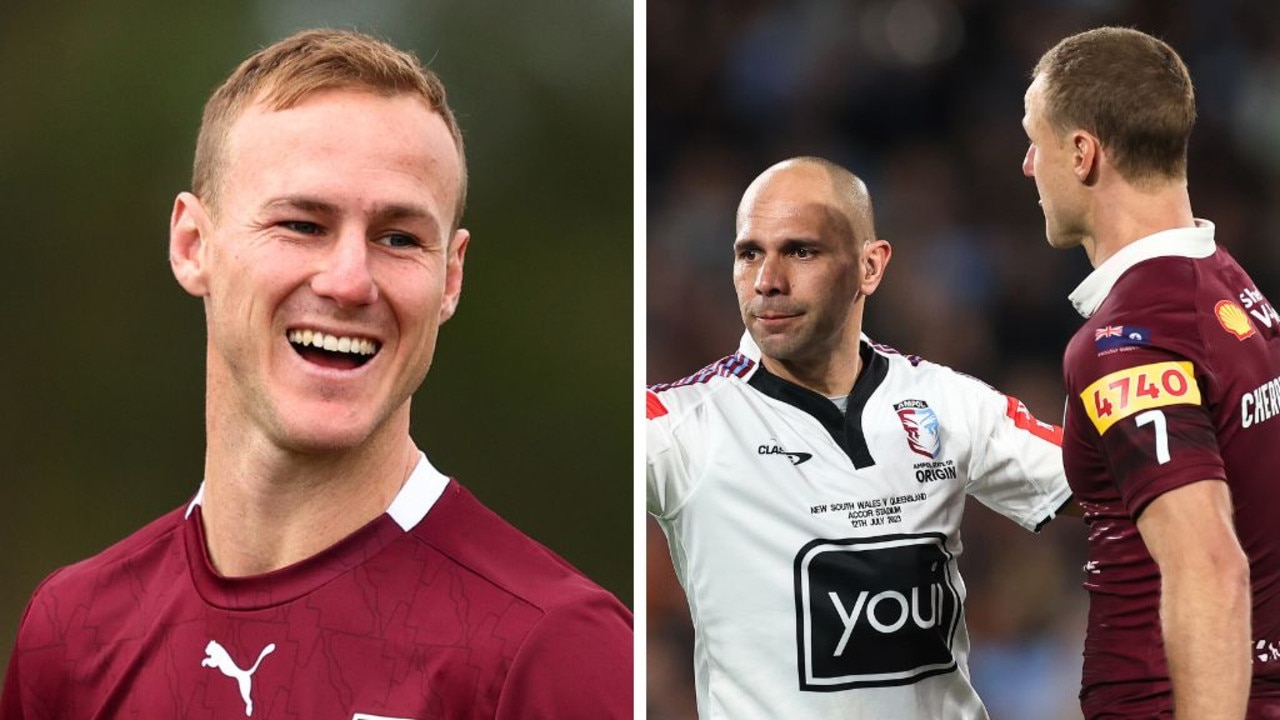The effects of Bulldogs and Blues legend Steve Mortimer’s battle with dementia
Bulldogs hero, NSW history-maker, halfback extraordinaire. Or, to most, just Turvey. DEAN RITCHIE sits down with Steve Mortimer and his son Andrew to understand the devastating effects of dementia on one of the game’s greats.
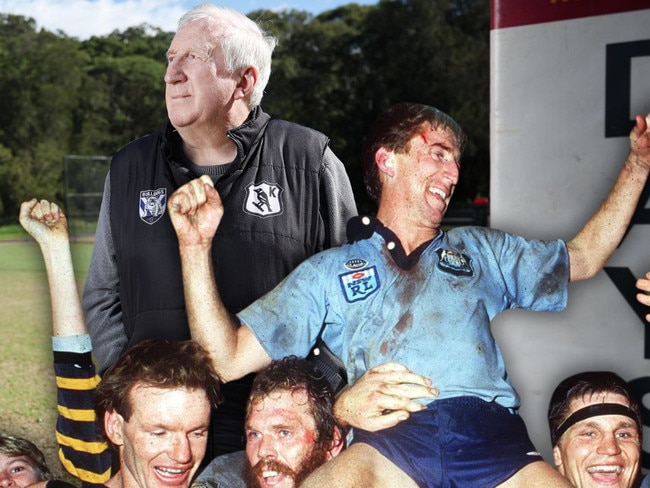
NRL
Don't miss out on the headlines from NRL. Followed categories will be added to My News.
They sit quietly together watching Bulldogs games over a beer inside a south-western Sydney bowling club.
The inconspicuous pair, one sporting a trimmed beard, the other short with grey hair, can also be found having coffee at a Revesby cafe or sitting together gently chatting on the balcony of a nearby aged care home.
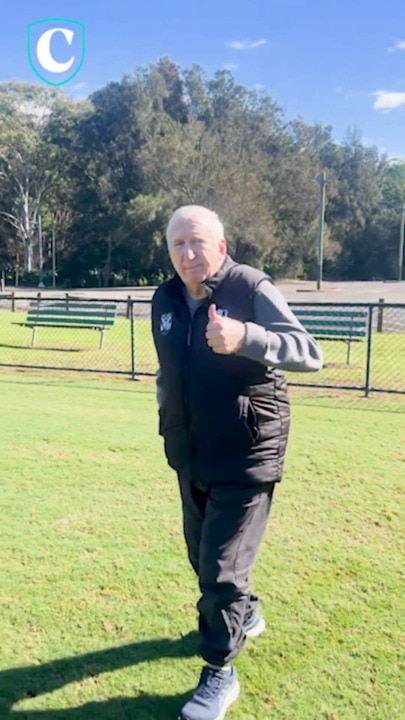
Conversation between the two can be challenging. One prompts talk about family, footy and daily life while the elderly man struggles to comprehend his new world, his blue eyes now largely vacant. He often ponders before thought patterns evaporate.
They are Steve and Andrew, father and son. But Steve’s not your average dad.
This is Steve Mortimer.
Top Dog, NSW history-maker, Bulldogs premiership-winner, hall of famer, halfback extraordinaire or, to most, just Turvey.
Turvey Mortimer — the inspiration of NSW, a hero of a state, an uplifting captain who led the Blues to their first series triumph 40 years ago.
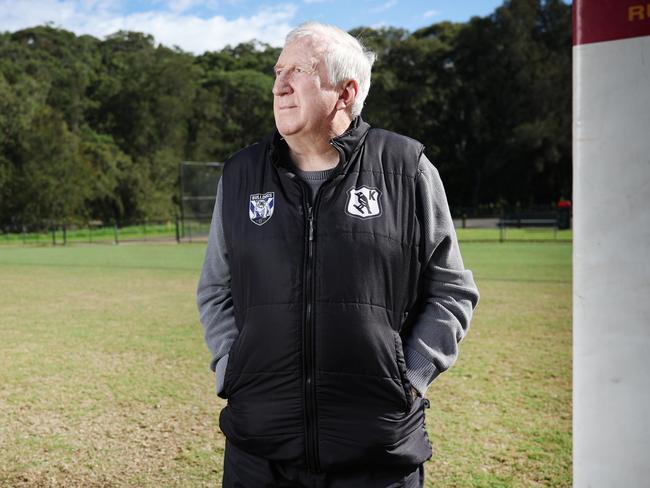
But right now, Mortimer’s cognitive levels are deteriorating.
He has battled dementia for nearly a decade and the toll this irreversible syndrome is having on Mortimer is clear.
Andrew, his sister Erin and mother Karen, along with the extended Mortimer family, visit Steve at his Revesby aged care home several times a week, and take him on excursions to the pub, cafe or local footy ground.
Sometimes Andrew buys two takeaway coffees and they sit together on the veranda adjoining Steve’s room. Andrew treasures his outings with dad, which are generally short because of his dad’s needs.
For our interview, Mortimer sits quietly on a wooden bench seat, surveying the leafy surroundings in Revesby Heights. He appears at ease in life and happily accepts instructions from Andrew and our photographer.

With Steve and brothers Chris, Peter and Glen having all played first grade, this family is footy royalty, which makes Steve’s condition even harder to understand.
His story is among the most poignant in rugby league, yet also highlights the indomitable courage and resilience of Steve Mortimer, one of the greatest players and competitors in the sport’s 117-year history.
Andrew dotes over his dad in touching testament to their enduring bond.
Steve appears to be in good physical health but communication is difficult. He tries to answer — my God he tries — but the words often become entangled within his mind.
Andrew will often intervene to help Steve finish a sentence.
Only 68, he heartbreakingly struggles to remember his greatness, electric speed or four premierships, although a cheeky smile does occasionally flash across his famous face.
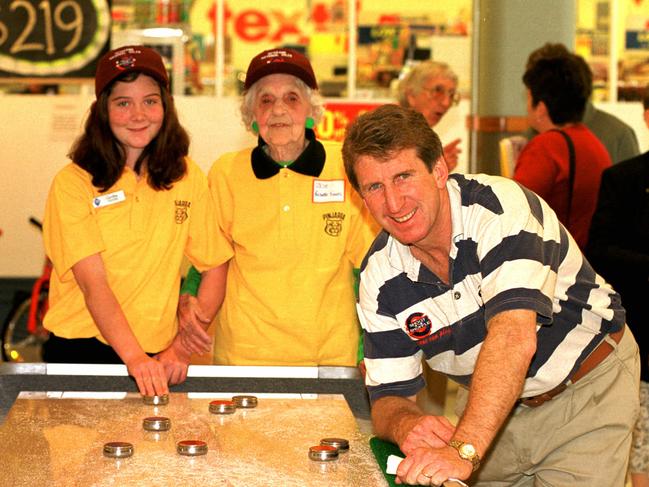
“It’s hard to know exactly what dad is thinking,” said Andrew, standing next to his father.
“But we go through it, don’t we, dad? I don’t know whether dad is thinking of something but can’t articulate it or he’s not thinking it but there’s not much verbally, unfortunately.
“I would say he’s on a slow decline. I’m sure people who see him a few months apart, or a year, would see significant change. He is seemingly calm, somewhat at peace with the situation and probably somewhat oblivious.
“My reading of (dad’s cognitive condition) is that he’s taking in part in what’s happening around him but processing that, and then articulating or engaging in a conversation, is close to impossible.
“I would suggest that he’s probably at the stage where he’s observing life around him, rather than fully participating. We know that you don’t get cured from dementia. You don’t improve so, for us, it’s quality of life. We try to take the approach: ‘what he can do’, not ‘what he can’t do’.
“His body language is more or less the same as at any point in his life, as in the warm approach dad always had with everyone. He has never been a man of status. He has always been reasonable, fair and available to anyone and everyone.”

Is Steve still able to complete a full sentence?
“Unlikely,” Andrew said.
We wish Mortimer’s mental faculties were better, especially as NSW prepare to celebrate the state’s 40-year anniversary for their inaugural Origin series win in 1985, when he was captain.
A jubilant Mortimer famously dropped to his knees to kiss the SCG turf after the win, creating one of the most iconic Origin moments ever.
And then there’s his beloved Bulldogs, running first on the NRL competition ladder for the first time since Round 4, 2016.
Unfortunately, Andrew doesn’t believe Steve is aware of Canterbury’s success this season.
“I don’t think so,” Andrew said. “Which is a shame because they are absolutely killing it.
“But we watch the games, either at his home or if we’re out-and-about, we will grab a beer or coffee and watch the game, usually at one of the local bowling clubs in and around Revesby, or a cafe. But, as time goes on, not so much. It is what it is.”
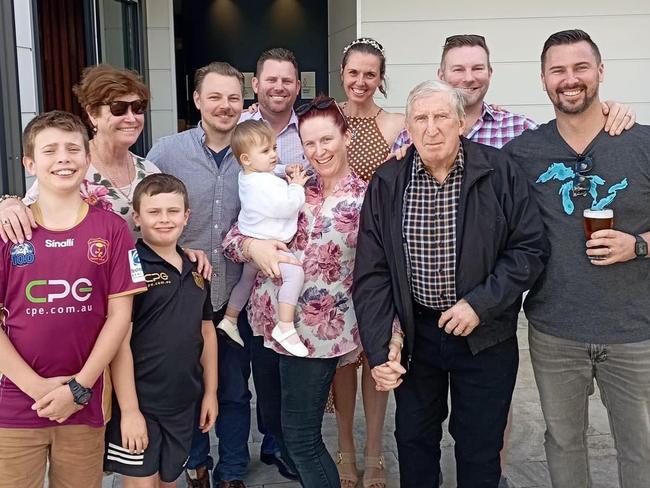
Steve was moved into a dementia ward in January 2022. The family say it was a traumatic period but the dedicated aged care staff have eased Mortimers’ early frustrations.
“Many people ask about dad quite regularly and I say: ‘Dad is doing well, he’s okay. Apart from the fact he has dementia, he’s physically OK, safe, comfortable and is still well connected to family and friends’,” Andrew said.
“Early in the piece, certainly before going into the aged care home, and shortly thereafter, he was frustrated. He knew what was going on or had an idea what’s going on but couldn’t articulate or participate in decision-making.”
Mortimer will engage in a regular schedule of different physical and mental stimulation activities throughout the day.
That may include playing shuffleboard, a game he used to sell when working post-football. There is diversional therapy, guessing games and balloon hobbies designed to help patients with muscle movement.
Mortimer may also watch television in a communal lounge room and often has visitors midmorning or midafternoon. He will often sit with people on his balcony.
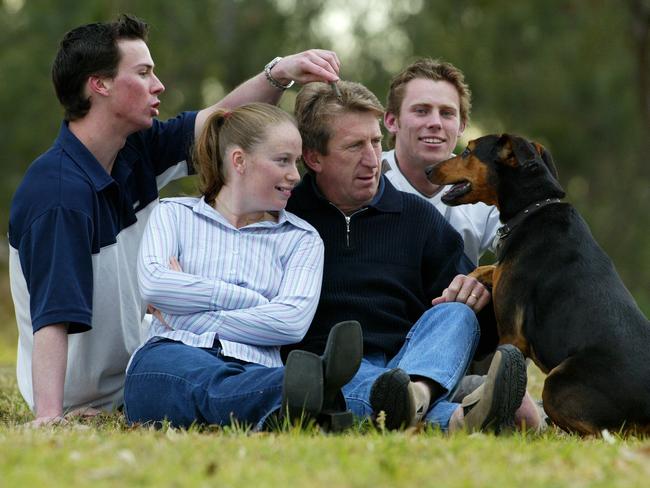
“There is a regular stream of visitors, family and friends and people from all sections of his life,” Andrew said.
Your correspondent met Steve and Andrew at Bill Delauney Reserve, Revesby Heights, home of St Christopher’s Junior Rugby League, a Canterbury district club where Steve once coached.
Now, Andrew is a committee member there and manages their under-11s side. His 10-year-old son Harry plays in the team. Andrew’s other son, Lachlan, 13, is a budding cricketer.
The family – Karen, Andrew, Erin — sometimes take Steve to watch St Christopher’s play. Another son, Matthew, lives in Chicago.
“We might come down here and watch some footy with my kids and the family, he will enjoy his granddaughters from my sister, and just socialise whenever we have key family Christmases, Easters and birthdays. That might be the family home in Illawong,” Andrew said.
“When we bring him to the footy, he needs assistance because of who he is. Everyone genuinely, and in a positive way, wants to be around him for a chat, which can be overstimulating as well.
“But we wouldn’t trade the first 60 years of dad’s life for what we’re going through and have been through.”
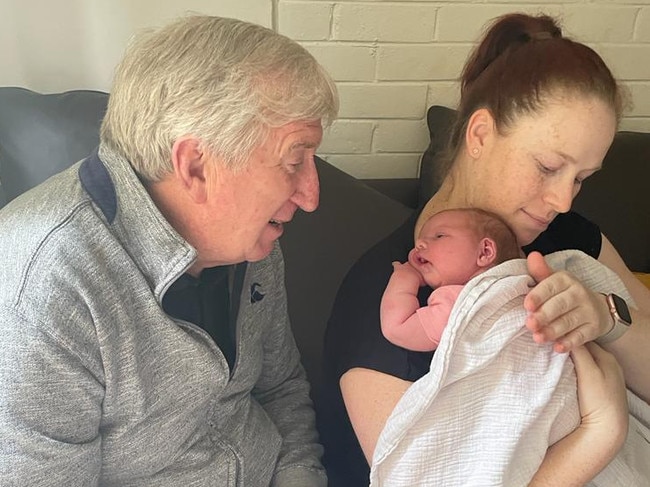
The legacy of Mortimer’s 1985 NSW heroics have forever followed the family – and they couldn’t be prouder.
“The way dad was received by the players at last year’s gathering before the True Blues Ball was fantastic. We had Nathan Cleary come up and almost ask for permission to say ‘G’day’ to dad. They were very respectful of his current condition,” Andrew said.
“From memory Nathan said: ‘Do you mind if I say hello to Turvey?’ Here’s a bloke that could go down as the greatest of all time, or potentially the greatest halfback of all time still showing dad respect.
“Dad has a special place in NSW history that no one else will have – he and the team from 1985. That was a first. You can measure a career on how many games someone played through statistics but it’s moments in history that are remembered. So to be the first Origin-winning captain – we’re extremely proud.
“I think we have a humble sense of pride in being Mortimers. Dad never took a backward step and is a leader. He was always my idol and I always wanted to walk in his footsteps. We try to keep it positive – look at what we have, not look at what we don’t have. That’s part of our upbringing.
“We had no airs or graces growing up, there was no status, so our family name certainly isn’t a burden. We don’t feel the weight of it. We were just a normal Australian family and we got on with it.”
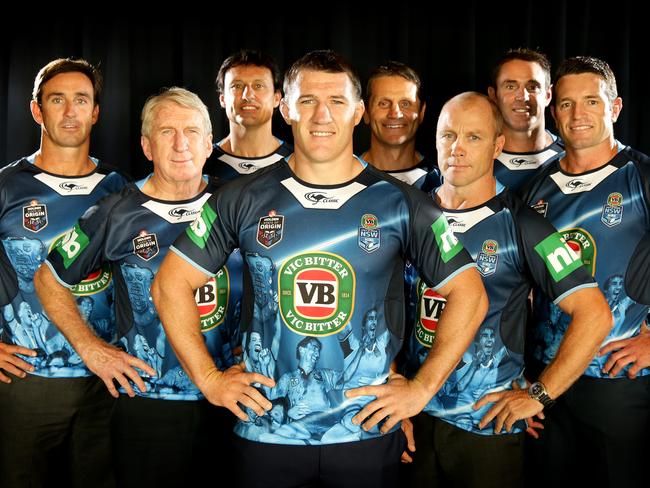
Noel ‘Crusher’ Cleal, a NSW teammate of Mortimer in ’85, said Mortimer instilled belief in the side that they could create history.
“I caught up with Turvey this time last year. As sad as it was, I still see him as Turvey, this massive inspirational leader and great human who gave me a big smile. He had that happy knack of being your friend but at the same time he was your master. He had a real presence about him,” Cleal said.
“You could seriously smell something about that 1985 series, with that team we had and belief that Turvey instilled in everybody. He had a will to win and his leadership was unbelievable. And not just through his deeds as a player but through his words and actions. If you weren’t inspired by Turvey then you weren’t fair dinkum.”
NSWRL chief executive David Trodden compared Mortimer to two Queensland legends.
“It pains everyone to watch Turvey endure his health struggles but he knows what everyone thinks of him and how important he is to NSW rugby league,” Trodden said.
“In the folklore of State of Origin, Queensland has a couple of icons in Arthur Beetson and Wally Lewis, around whom all of their mythology is centred. In NSW, we have had our great players, some of them Immortals, but Turvey is our Arthur Beetson or Wally Lewis.
“The image of Turvey falling to his knees when he led NSW to its first State of Origin win in 1985 is our most iconic image. He represents everything that embodies a NSW State of Origin player.
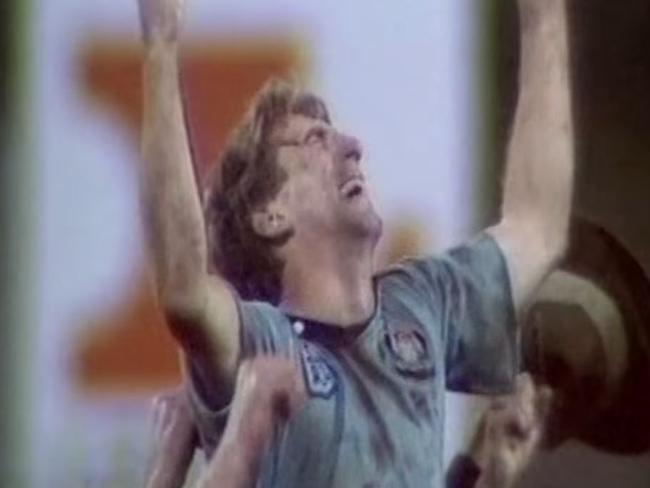
“When we opened our Centre of Excellence at Sydney Olympic Park in 2019, we put a massive mural on the front of our building – something that was synonymous with NSW rugby league which every passer-by would recognise and identify with.
“That image is Turvey in 1985.”
Current Blues coach Laurie Daley gave rare praise to Mortimer.
“Turvey showed so much passion for NSW in his eyes and actions, and how much winning meant,” Daley said. “The 1985 moment was unforgettable and iconic. Without knowing it, it was probably the first time NSW started to realise what we could do. It meant so much to him.”
Steve ‘Bubba’ Gearin played with Mortimer in Canterbury’s exciting 1980 grand final-winning side, dubbed The Entertainers.
“I saw Turvey a couple of months ago. I looked at him and thought there was a smile there. He is ‘down the track’ with his dementia,” Gearin said.
“Peter Sterling was a good player but Turvey was the Nathan Cleary of our era. Steve could win games on his own. He was the architect and instigator of The Entertainers. We had a lot of ball players but he was the bloke who ignited things.
“Steve was the greatest player I ever played with, without question. Turvey, absolutely number one in the late 1970s and ’80s. He was a brilliant player with brilliant speed.”
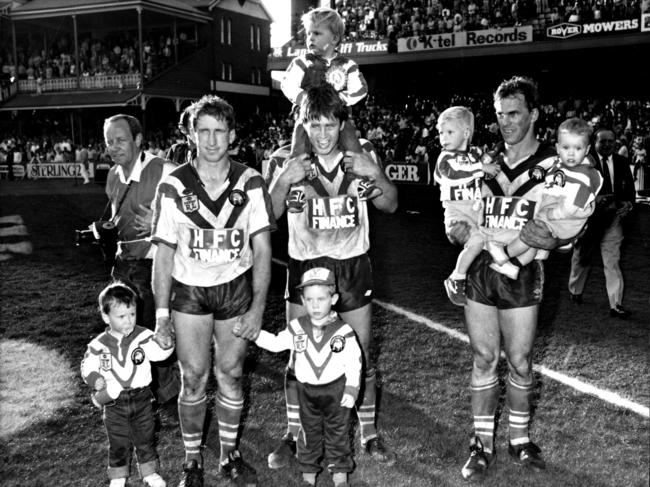
The Mortimers aren’t fighting Steve’s struggles alone. They know the entire rugby league community is sitting on their stoic shoulders.
A brotherhood, and sisterhood, that will unite for a rugby league giant.
“Peter, Chris, Glen and Jenny (Mortimer’s sister), all the family, are well connected to him and visit quite regularly. I have to give my uncle ‘Parrot’ (Peter) and aunty Jenny a big wrap for jumping in and being a people of action,” Andrew said.
“Karen’s brother and sister, my uncle Scott (Johnson) and aunty Tracy (Chynoweth) have also been spending time with dad and helping the family.
“Dad has a good circle of mates and is very well respected in the game and by the Bulldogs. There is no shortage of people thinking about him, reaching out to help and keep him connected as his needs shift.
“We do feel the love.”
More Coverage
Originally published as The effects of Bulldogs and Blues legend Steve Mortimer’s battle with dementia





